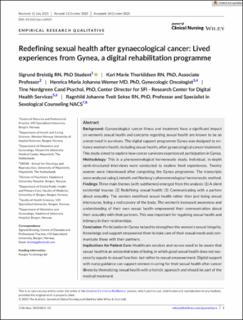| dc.contributor.author | Breistig, Sigrund | |
| dc.contributor.author | Sekse, Ragnhild Johanne Tveit | |
| dc.contributor.author | Thorkildsen, Kari Marie | |
| dc.contributor.author | Nordgreen, Tine | |
| dc.contributor.author | Werner, Erica H.M.J | |
| dc.date.accessioned | 2024-02-02T06:24:56Z | |
| dc.date.available | 2024-02-02T06:24:56Z | |
| dc.date.created | 2023-10-18T11:46:01Z | |
| dc.date.issued | 2023 | |
| dc.identifier.issn | 0962-1067 | |
| dc.identifier.uri | https://hdl.handle.net/11250/3115149 | |
| dc.description.abstract | Background:
Gynaecological cancer illness and treatment have a significant impact on women's sexual health and concerns regarding sexual health are known to be an unmet need in survivors. The digital support programme Gynea was designed to enhance women's health, including sexual health, after gynaecological cancer treatment. This study aimed to explore how cancer survivors experienced participation in Gynea.
Methodology:
This is a phenomenological hermeneutic study. Individual, in-depth semi-structured interviews were conducted to explore lived experiences. Twenty women were interviewed after completing the Gynea programme. The transcripts were analysed using Lindseth and Norberg's phenomenological hermeneutic method.
Findings:
Three main themes (with subthemes) emerged from the analysis: (1) A silent existential trauma; (2) Redefining sexual health; (3) Communicating with a partner about sexuality. The women redefined sexual health rather than just being sexual intercourse, being a rediscovery of the body. The women's increased awareness and understanding of their own sexual health empowered their communication about their sexuality with their partners. This was important for regaining sexual health and intimacy in their relationships.
Conclusion:
Participation in Gynea helped to strengthen the women's sexual integrity. Knowledge and support empowered them to take care of their sexual needs and communicate these with their partners.
Implications for Patient Care:
Healthcare services and nurses need to be aware that sexual health is an existential state of being, in which good sexual health does not necessarily equate to sexual function, but rather to sexual empowerment. Digital support with nurse guidance can support women in caring for their sexual health after cancer illness by thematizing sexual health with a holistic approach and should be part of the medical treatment.
Patient or Public Contribution:
Twenty gynaecological cancer survivors contributed by sharing their experiences from the sexual health module in Gynea. | en_US |
| dc.language.iso | eng | en_US |
| dc.publisher | Wiley | en_US |
| dc.rights | Navngivelse 4.0 Internasjonal | * |
| dc.rights.uri | http://creativecommons.org/licenses/by/4.0/deed.no | * |
| dc.title | Redefining sexual health after gynaecological cancer: Lived experiences from Gynea, a digital rehabilitation programme | en_US |
| dc.type | Peer reviewed | en_US |
| dc.type | Journal article | en_US |
| dc.description.version | publishedVersion | en_US |
| dc.rights.holder | © 2023 The Authors | en_US |
| dc.source.journal | Journal of Clinical Nursing (JCN) | en_US |
| dc.identifier.doi | 10.1111/jocn.16923 | |
| dc.identifier.cristin | 2185850 | |
| dc.relation.project | Norges forskningsråd: 309264 | en_US |
| cristin.ispublished | true | |
| cristin.fulltext | original | |
| cristin.qualitycode | 2 | |

